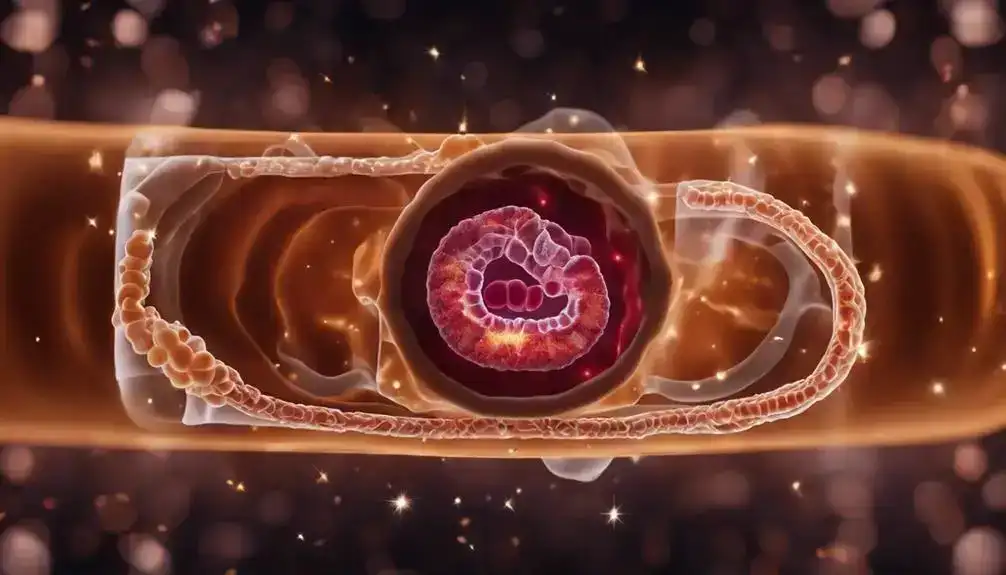Caffeine in coffee boosts colon muscle contractions, pushing waste out efficiently. This increased muscle activity leads to more frequent bowel movements. Your colon motility greatly impacts overall bowel health. About 30% of people feel the urge to poop after coffee due to caffeine sensitivity variations.
Monitoring your body’s response helps manage these effects. Adjusting caffeine intake can regulate bowel habits effectively. Caffeine stimulates colon contractions more in caffeinated than decaf coffee. Understanding caffeine’s influence on your colon function is crucial for digestive health. Explore further to comprehend how caffeine impacts your gut health.
How Does Caffeine in Coffee Affect Your Colon?

When you sip your morning coffee, the caffeine starts a chain reaction in your colon. It triggers stronger contractions in your colon muscles, propelling waste towards the exit.
This can lead to an urgent need to use the bathroom for about 30% of coffee drinkers.
Understanding how caffeine influences your colon contractions can shed light on why that cup of coffee often leads to a quick trip to the restroom.
Understanding Colon Contractions from Caffeine
Caffeine in coffee triggers stronger contractions in your colon, leading to increased muscle activity and bowel movements. This important colon motility plays a pivotal role in maintaining overall bowel health.
When caffeine stimulates your colon, it causes the muscles to contract more vigorously, pushing waste towards the rectum at a faster pace. This increased activity can result in a heightened urge to have a bowel movement.
Understanding how caffeine affects colon contractions sheds light on why coffee often leads to more frequent and urgent trips to the bathroom for many individuals. By comprehending this process, you can better grasp why caffeine-induced bowel movements are a common occurrence for coffee drinkers.
How Many People Experience Caffeine-Induced Bowel Movements?
Approximately 30% of individuals experience the need to have a bowel movement after consuming coffee due to its impact on colon activity.
This phenomenon is a result of caffeine sensitivity, which varies among people and can lead to changes in bowel habits. Caffeine stimulates the colon, causing increased muscle contractions and promoting bowel movements for those who are more sensitive to its effects.
If you find yourself rushing to the restroom after your morning cup of coffee, you’re not alone. Understanding your body’s response to caffeine can help you manage these bowel-stimulating effects.
Pay attention to how your body reacts to coffee and consider adjusting your caffeine intake or timing to regulate your bowel habits effectively.
The Influence of Caffeine on Your Digestive System
When you sip your morning coffee, do you ever wonder why it seems to kickstart your digestive system? Here’s why:
Caffeine acts as a stimulant, ramping up the intensity and frequency of colon contractions.
Caffeinated coffee has a more pronounced effect on colon activity compared to decaf due to caffeine’s natural stimulating properties.
This enhanced digestive motility can lead to quicker bowel movements, especially after consuming caffeinated beverages.
How Caffeine Stimulates Colon Activity
Engaging in your daily coffee routine can have a pronounced impact on the activity of your colon due to the stimulating effects of caffeine on your digestive system.
Caffeine acts as a stimulant, enhancing colon contractions’ frequency and intensity, which can lead to increased bowel movements shortly after consumption.
This stimulation contributes to better colon health by promoting regularity in your digestive system.
The presence of caffeine in coffee is known to increase poop frequency for many individuals, triggering stronger muscle contractions in the colon and aiding in moving stool efficiently through the intestines.
Understanding how caffeine influences colon activity can help you appreciate the role of coffee in your digestive health and overall well-being.
Comparing Effects of Caffeinated vs. decaffeinated coffee
How does the presence of caffeine in coffee impact the digestive system when comparing caffeinated and decaffeinated coffee? When looking at the effects of caffeinated versus decaffeinated coffee on your digestive system, the key factor to consider is the caffeine content. Caffeinated coffee contains a higher level of caffeine, a natural stimulant that enhances colon activity. This increased stimulation can lead to more pronounced bowel movements compared to decaffeinated coffee. Below is a comparison table highlighting the differences between caffeinated and decaffeinated coffee regarding their impact on your digestive system:
| Aspect | Caffeinated Coffee | Decaffeinated Coffee |
|---|---|---|
| Caffeine Content | Higher | Absent |
| Colon Stimulation | Increased muscle contractions | Lesser effect on contractions |
| Bowel Movement Rate | Faster | Slower |
| Overall Impact | Stronger effect on digestion | mild impact on digestion |
What is the Hormonal Reaction to Caffeine in Coffee?

When you drink coffee, the caffeine in it triggers the release of hormones like gastrin and cholecystokinin (CCK), crucial for digestion.
These hormones stimulate the gastrocolic reflex, which amps up colon activity and can lead to bowel movements.
Understanding how caffeine influences these hormones sheds light on why coffee can impact your gut in such a noticeable way.
The Role of Gastrin and Cholecystokinin (CCK) Hormones
Frequently, caffeine in coffee triggers the release of hormones such as gastrin and cholecystokinin (CCK) that play vital roles in promoting gut motility and aiding in digestive enzyme secretion.
Gastrin stimulates the production of gastric acid, supporting digestion, while CCK signals the gallbladder to release bile and the pancreas to secrete digestive enzymes, facilitating the breakdown of food.
These hormonal responses contribute to the overall enhancement of digestive processes and the movement of food through the gastrointestinal tract.
How These Hormones Trigger the Gastrocolic Reflex
The hormonal response triggered by caffeine in coffee, specifically the release of gastrin and cholecystokinin (CCK) hormones, plays a crucial role in stimulating the gastrocolic reflex.
Gastrin and CCK are key players in hormonal regulation, enhancing gut motility and digestive enzyme secretion.
When caffeine prompts the release of these hormones, it initiates reflex mechanisms that increase colon activity in response to food or drink intake.
This heightened colon activity aids in moving fecal matter towards the rectum, ultimately leading to bowel movements.
Understanding how these hormones work in tandem with caffeine to trigger the gastrocolic reflex provides insight into why coffee can have such a pronounced effect on your digestive system.
Why Does Timing Matter: Caffeine and the Gastrocolic Reflex?
Have you ever wondered why your morning coffee seems to have a direct line to your bowels? Well, the timing of your caffeine intake plays an essential role in this phenomenon.
Here are three key points to ponder about why caffeine makes you poop more in the morning and how the gastrocolic reflex impacts your bowel movements:
- Morning coffee consumption aligns with the heightened activity of the gastrocolic reflex, increasing the likelihood of bowel movements.
- The gastrocolic reflex is a potent physiological response triggered by stomach stretching, which caffeine amplifies, leading to faster transit of stool.
- Understanding the interaction between caffeine timing and the gastrocolic reflex can help you better manage your bowel habits throughout the day.
Why Does Caffeine Make You Poop More in the Morning?
In the morning, the heightened activity of the gastrocolic reflex coincides with your coffee consumption, leading to an increased likelihood of bowel movements. This synchronization is vital as the gastrocolic reflex is most active in the morning when your body is naturally preparing for the day ahead.
If you have a routine of drinking coffee upon waking up, the caffeine further stimulates this reflex, prompting your colon to contract and move waste along more rapidly. For individuals sensitive to caffeine, this combination can result in a more pronounced urge to poop in the morning, aligning with your typical morning routines.
Understanding this relationship can help you anticipate and manage the effects of caffeine on your digestive system throughout the day.
The Gastrocolic Reflex and Its Impact on Bowel Movements
Morning coffee consumption triggers the gastrocolic reflex, a significant physiological response that enhances colon activity and promotes bowel movements due to the heightened morning activity of this reflex.
The gastrocolic reflex plays an essential role in gut health by regulating bowel movements and ensuring efficient digestion. When caffeine stimulates this reflex, it accelerates the transit of food through the digestive system, aiding in bowel regulation.
Understanding the impact of the gastrocolic reflex on your bowel movements can help you manage your coffee intake to optimize gut health. By being mindful of the timing of your caffeine consumption, especially in the mornings when this reflex is most active, you can harness its effects to support a healthy digestive system and regular bowel movements.
What Coffee Compounds Work with Caffeine to Stimulate Your Gut?

Coffee isn’t just about caffeine; it contains chlorogenic acids that can boost gastric acid production and speed up digestion, aiding in gut stimulation.
Additionally, other compounds like melanoidins contribute to coffee’s laxative effect by enhancing digestive activity.
Understanding how these coffee compounds work together with caffeine can provide insights into how your gut responds to that morning cup of joe.
The Effect of Chlorogenic Acids on Digestion
Chlorogenic acids found in coffee play a significant role in enhancing digestion by increasing gastric acid production and accelerating the transit of contents through the gut. When it comes to your gut health benefits, these antioxidants can have a profound impact.
- Antioxidant Power: Chlorogenic acids act as antioxidants, reducing inflammation and protecting your gut cells from damage.
- Stimulation of Gastric Juices: These compounds stimulate the production of gastric juices, aiding in the breakdown of food and absorption of nutrients.
- Improved Digestive Transit: By speeding up the transit of food through your digestive system, chlorogenic acids can help prevent constipation and promote regular bowel movements.
Other Gut-Stimulating Compounds in Coffee
Other compounds in coffee, aside from chlorogenic acids, contribute to its gut-stimulating effects by enhancing digestive activity and promoting a laxative effect.
Melanoidins and various bioactive compounds found in coffee play a role in stimulating your gut. These compounds work alongside caffeine to boost gut health by increasing digestive enzyme secretion and improving overall digestion.
Melanoidins, formed during the roasting process, aid in promoting bowel regularity and maintaining healthy gut function. By enhancing the activity of digestive enzymes, coffee compounds help break down food efficiently and support the smooth movement of waste through your digestive system.
Understanding how these additional compounds interact with caffeine can provide insights into the overall impact of coffee on your gut health.
How Additives in Coffee Affect Caffeine’s Impact on Digestion

When you add dairy products to your coffee, especially if you’re lactose intolerant, you might experience bloating, cramps, and diarrhea due to the impact on your digestion.
Additionally, sugar substitutes like Splenda can lead to symptoms such as gas and diarrhea, intensifying the laxative effect of coffee.
Being aware of how additives in your coffee can affect your digestive system is vital for managing any discomfort that may arise.
The Impact of Dairy Products and Lactose Intolerance
If you are lactose intolerant, incorporating dairy products into your coffee consumption can exacerbate digestive issues and lead to symptoms such as bloating, cramps, and diarrhea. Dairy contains lactose, a sugar that some individuals have trouble digesting due to a deficiency in the enzyme lactase. This can result in gastrointestinal discomfort and may worsen existing digestive problems. To counteract these issues and maintain gut health, you can consider incorporating probiotics and fiber supplements into your diet. Probiotics can help balance the gut microbiota, while fiber supplements can aid in digestion and promote regularity. Making these adjustments can support your digestive system and minimize the impact of lactose intolerance when enjoying your coffee.
| Dairy Products and Lactose Intolerance | Symptoms | Recommendations |
|---|---|---|
| Bloating | Cramps | Incorporate probiotics |
| Diarrhea | digestive discomfort | Use fiber supplements |
Sugar Substitutes and Their Digestive Side Effects
Sugar substitutes in coffee can lead to digestive symptoms like gas and diarrhea in some individuals, enhancing the laxative effect of caffeine. When artificial sweeteners are added to your daily brew, be mindful of their potential impact on your digestive health.
Here are three key points to keep in mind:
- Digestive Implications: Artificial sweeteners can disrupt the balance of gut bacteria, leading to gastrointestinal discomfort.
- Caffeine Alternatives: Reflect on opting for unsweetened coffee or using natural sweeteners like honey to minimize digestive issues.
- Maintaining Digestive Health: Pay attention to how your body reacts to different additives in your coffee to support a healthy digestive system.
How Can You Manage the Urge to Poop After Drinking Caffeinated Coffee?
Feeling the urge to poop after your morning coffee can be bothersome, but there are ways to manage this inconvenience.
Here are three practical tips to help you minimize the bowel-stimulating effects of caffeine in coffee:
- Reduce Your Coffee Intake: Cutting down on the amount of coffee you drink can lessen its impact on your bowel movements.
- Switch to Decaf: Opting for Decaffeinated coffee can still give you the pleasure of a warm beverage without the strong laxative effects of caffeine.
- Adjust Your Coffee Habits: Experiment with plant-based milk alternatives and different sweeteners to see what works best for your digestive system.
Tips to Minimize Caffeine’s Bowel-Stimulating Effects
To manage the urge to poop after drinking caffeinated coffee, consider adjusting your coffee intake habits, exploring decaffeinated options, or changing the timing of your coffee consumption.
Here are some tips to help minimize caffeine’s bowel-stimulating effects:
- Dietary adjustments and hydration: Increase fiber intake to regulate bowel movements and stay hydrated to promote healthy digestion.
- Lifestyle changes and moderation: Practice moderation in coffee consumption, incorporate stress-relief techniques, and maintain a regular exercise routine to support gut health.
- Timing adjustments: Drink coffee after a meal when the gastrocolic reflex is less active, allowing for better control over bowel movements.
Alternative Milk Options and Adjusting Coffee Habits
Consider exploring alternative milk options and adjusting your coffee habits to help manage the urge to poop after consuming caffeinated coffee.
- Plant-Based Alternatives: Swap traditional dairy milk for plant-based alternatives like almond, soy, or oat milk. These options are gentler on the stomach and may help reduce digestive discomfort.
- Sweetener Adjustments: Opt for natural sweeteners like honey or maple syrup instead of artificial sugar substitutes. Artificial sweeteners can sometimes exacerbate digestive issues, while natural options are easier on the gut.
- Experiment with Different Coffee Habits: Try switching to decaffeinated coffee, reducing the strength of your brew, or drinking coffee at different times of the day to see if it affects your bowel movements less.
Why Are Some People More Sensitive to Caffeine’s Laxative Effects?
Some individuals may experience heightened sensitivity to caffeine’s laxative effects due to varying factors.
- Genetic predisposition: Genetics play a role in determining how your body processes caffeine, affecting its impact on your colon.
- Digestive health: The health of your digestive system can influence how sensitive you’re to caffeine’s bowel-stimulating properties.
- Caffeine tolerance: Your overall tolerance to caffeine, which can develop over time with regular consumption, also affects how strongly it affects your bowel movements.
Why Are Some People More Sensitive to Caffeine?
Individuals vary in their sensitivity to caffeine, influencing the extent to which it affects their colon activity and bowel movements. Genetic factors play a significant role in determining why some people are more sensitive to caffeine’s laxative effects.
Certain genetic variations can make individuals more prone to feeling the urge to poop after consuming caffeine. Additionally, caffeine tolerance, which can vary among people, affects how the body responds to caffeine’s stimulating properties.
Those with lower caffeine tolerance may experience stronger bowel movements compared to those with higher tolerance levels. Understanding these genetic and tolerance factors can help explain why some individuals are more sensitive to caffeine’s effects on their digestive system.
How Regular Coffee Drinkers Develop Tolerance
Regular coffee drinkers develop tolerance to caffeine over time, impacting how strongly it affects their colon activity and bowel movements.
Habitual consumption of caffeine can lead to a decreased sensitivity to its laxative effects. When you regularly consume coffee, your body adapts to the presence of caffeine, requiring higher amounts to produce the same stimulating effect on your colon.
This tolerance development is influenced by genetic factors, digestive health, and overall caffeine sensitivity. As your body becomes accustomed to caffeine, the initial strong urge to poop after drinking coffee may diminish.
Understanding how tolerance to caffeine develops is crucial for individuals aiming to manage their digestive responses to coffee effectively.
How Can You Use Caffeinated Coffee as a Natural Laxative?

If you’re looking to use caffeinated coffee as a natural laxative, understanding how caffeine helps relieve constipation is key. By following best practices for using coffee to improve digestion, you can maximize its benefits.
Consider these three points to harness the natural laxative properties of caffeinated coffee:
- How Does Caffeine Help Relieve Constipation?: Caffeine’s stimulating effect on the colon can aid in promoting bowel movements naturally.
- Best Practices for Using Coffee to Improve Digestion: Drinking coffee at specific times, staying hydrated, and maintaining a balanced diet can enhance its digestive benefits.
- Implementing Coffee as a Natural Laxative: Learn how to incorporate caffeinated coffee strategically to assist in digestion and alleviate constipation.
How Does Caffeine Help Relieve Constipation?
Utilizing caffeinated coffee as a natural laxative can assist in relieving constipation due to its stimulating effect on the colon, promoting bowel movements effectively. Caffeine acts as a stimulant, increasing the frequency and intensity of colon contractions, aiding in the expulsion of stool. This stimulation helps move waste through the digestive system more efficiently.
Additionally, staying extremely important for supporting healthy bowel function. hydration levels play a significant role in softening stool, making it easier to pass. When combined with a diet rich in dietary fiber, coffee’s laxative properties can be enhanced, as fiber adds bulk to the stool, further aiding in regular bowel movements.
Consuming caffeinated coffee alongside a fiber-rich diet and proper hydration can naturally alleviate constipation.
Best Practices for Using Coffee to Improve Digestion
To optimize the digestive benefits of caffeinated coffee and utilize it as a natural laxative, pairing your coffee consumption with a fiber-rich diet and adequate hydration is crucial.
Here are three practices to enhance your gut health and digestive wellness:
- Timing Matters: Drink your coffee in the morning to align with the body’s natural rhythms and capitalize on the gastrocolic reflex for improved bowel movements.
- Stay Hydrated: Make sure you drink enough water throughout the day to support the digestive process and prevent dehydration, which can lead to constipation.
- Balanced Diet: Incorporate fiber-rich foods like fruits, vegetables, and whole grains into your meals to promote healthy digestion and regular bowel movements.
Conclusion
As you reach for that morning cup of coffee, remember that the caffeine within it can have a powerful impact on your colon.
Understanding how caffeine stimulates muscle contractions in your digestive system can help you manage the urge to poop after drinking coffee.
By considering factors like timing, additives, and individual sensitivity, you can navigate the coincidental relationship between caffeine and bowel movements.
So next time you feel the call of nature after your coffee, know that science is at play.

